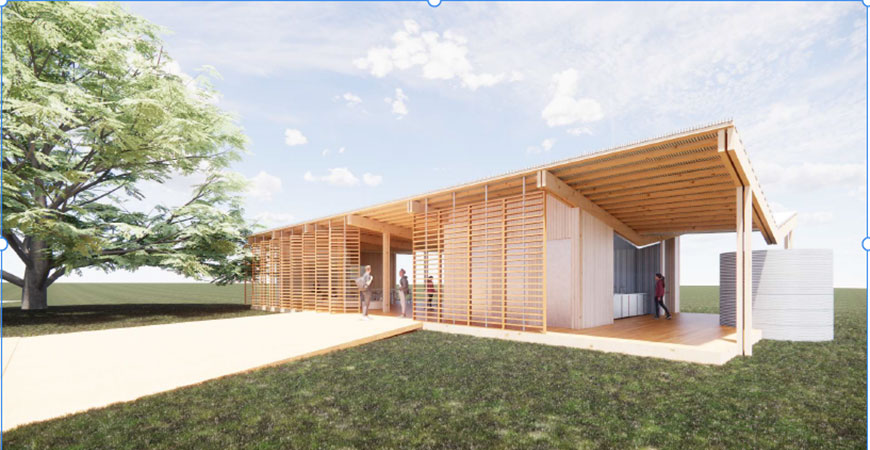
Even though the Merced Vernal Pools and Grassland Reserve (MVPGR) is adjacent to campus, it's an area that can be daunting to access.
Last year, more than 2,000 people visited the reserve or campus lands adjacent to the reserve to learn about this unique habitat and the animals and plants that are protected there. Guided visitors included schoolchildren on tours and researchers. However, visiting requires finding parking on campus and walking out to the land, which is not easy for people with disabilities or those carrying a lot of equipment. Once there, for much of the year, the weather can be windy, rainy or blisteringly hot and there are no facilities where people can take shelter, use the restroom or wash their hands.
“Researchers are used to working in a variety of field conditions, but the lack of facilities could be a real barrier for students and other visitors,” said paleoecology Professor Jessica Blois, faculty director of UC Merced’s natural reserves.
This year, that's going to change. Reserve leaders, including Blois, Associate Director Jessica Malisch and Reserve Director Joy Baccei, have been gathering funds from donors and grants to build the new Field Education Center near the site of the old barn on the strip of property between campus and the primary conservation lands — more than 6,000 acres northeast of campus. They will also resurface the road that leads from the reserve gate on Ranchers Road out to the new building.
The goal is to have the center ready to use in the fall, Malisch said. Much of the structure’s construction will be done offsite and driven the 3/4 of a mile out to its new home, where the pieces will be put together, not unlike a classic barn-raising event. As early as April, work will begin on the road, which will be resurfaced with a recycled, permeable covering that will have turnouts so vehicles can pass each other, areas for school buses to turn around and a small parking zone for people with disabilities.
“I am really excited about how this project will increase access for the Merced community to learn about the importance of vernal pools as a seasonal wetland, unique species and the special history of the natural reserve land,” Malisch said.
People will be able to learn more about the grand vision for the Education Center when the MVPGR’s 10 th anniversary is celebrated with a science symposium, tours, a student poster presentation, a reception and more, from 8 a.m. to 5:30 p.m. April 12.
What is known so far is that the structure will be off the grid, so there will be no Internet and limited electricity. It will be an open-air pavilion that provides shelter and allows people to enjoy the views and see vernal pools while also protecting the pools from visitor traffic. The highly sustainable building will have solar panels to provide light, a rainwater capture system and three bathrooms with composting toilets.
The Wildlife Conservation Board recently awarded the reserve leaders $920,000 from Proposition 68, which contained a provision to support infrastructure projects for the UC Natural Reserve System.
“We had this project in mind, but it required a 25% match. The UC Merced Foundation Board of Trustees generously designated their Impact Funds for the Reserve two years in a row, and Chancellor Juan Sánchez Muñoz made additional funds available to us,” Blois said.
The MVPGR has been a site for research since before it was an officially recognized UC reserve. It features ancient soils, endangered species and the vernal pools, which are a disappearing feature of California land.
About 55% of the reserve’s use is educational, mainly students from UC Merced taking field trips as part of their courses. But other students from area state and community colleges and K-12 schools also visit the reserve for hands-on educational and field research experiences, Baccei said.
The new Field Education Center will allow for expanded educational programming and community outreach, she said.
“I look forward to providing transformational educational experiences to both students and the community alike to inspire our next generation of environmental leaders and also inspire social and environmental change,” Baccei said.
To attend the anniversary event, please RSVP online.



